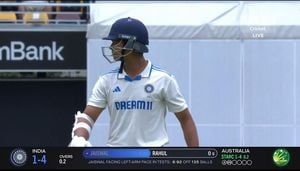Romário de Souza Faria, known simply as Romário, is often celebrated as one of Brazil's football legends, particularly remembered for his standout career and pivotal moments on the pitch. His return to Brazilian football with Flamengo stands out as one of the most remarkable chapters of his storied career, particularly following his success with Barcelona and the Brazilian national team.
Back in 1995, Romário made headlines when he decided to leave the prestigious Catalan club, Barcelona, to rejoin Flamengo. At the time, he was not only the reigning FIFA World Player of the Year but also the hero of Brazil's 1994 World Cup victory. This decision shocked many considering the continuous success he could have enjoyed abroad. Romário himself was candid about his motivation: "Minha contratação foi algo único. Eu era o melhor jogador da Copa, campeão do mundo e resolvi voltar ao Flamengo no auge. Não me arrependo de nada. Deixei de ser mais rico para ser mais feliz," he stated during his recent reflections on his career. His choice, he emphasized, was driven more by personal happiness than by financial gains.
The reception Romário received upon his arrival at Flamengo was nothing short of extraordinary. Fans and players alike welcomed him with open arms, as he took part in a lavish car parade through the streets of Rio de Janeiro, showcasing not just his historical impact but also his status as a beloved figure. This warm welcome communicated the hopes and expectations placed on him to revive Flamengo's fortunes, which at the time were seen as challenging. Romário's return marked not only personal fulfillment but also the rekindling of Flamengo's prominence within Brazilian football.
Romário's transition back to the national scene was remarkable, and many believed it played an instrumental role during tumultuous times for Brazilian football. The year 1993 was particularly significant; it featured the historic match between Brazil and Uruguay, where Romário was pivotal, scoring two goals and ensuring Brazil's qualification for the 1994 World Cup. This performance not only solidified his position as one of Brazil's top talents but also highlighted his ability to thrive under pressure.
Decades later, Romário is discerning about the rarity of talent returning to Brazil like he did. He expressed concerns over the economic gap between Brazilian clubs and their European counterparts, leaning onto the subject with nostalgia and realism. "Não veremos algo assim tão cedo. Contratar um jogador nesse nível, no auge, para voltar ao Brasil, é algo que talvez nunca aconteça de novo," he said, reflecting on how the market dynamics have drastically shifted since his monumental return. His sentiments resonate within the current football environment, characterized by inflated transfer fees and increasingly competitive European leagues.
Recently, Romário attended the farewell match of fellow Flamengo legend Adriano Imperador. The occasion was not only about saying goodbye to another iconic player, but also served as a moment for Romário to celebrate his friend's illustrious career. "Adriano é um cara de coração enorme, uma pessoa do bem, que superou muitas dificuldades e merece essa festa. É justo ele ter a chance de ser feliz novamente no Maracanã, vestindo a camisa do Flamengo contra um time onde ele também fez história," Romário remarked warmly. This statement encapsulates the bond between two players who, though from different generations, both left indelible marks on Brazilian football and the Flamengo club's legacy.
Romário's impactful return to Flamengo continues to resonate not just because of his individual achievements but also due to the extraordinary phase of Brazilian football he embodied. His ability to draw attention back to Brazil during the 1990s redefined expectations for players returning home from abroad. His story inspires current and future generations to pursue not just success but also happiness within their career choices, signaling the often overlooked joy of playing where one feels most connected. The legacy of Romário remains, forever ingrained in the hearts of Brazilian football fans, reminding them of the joy and pride one man brought back home.



